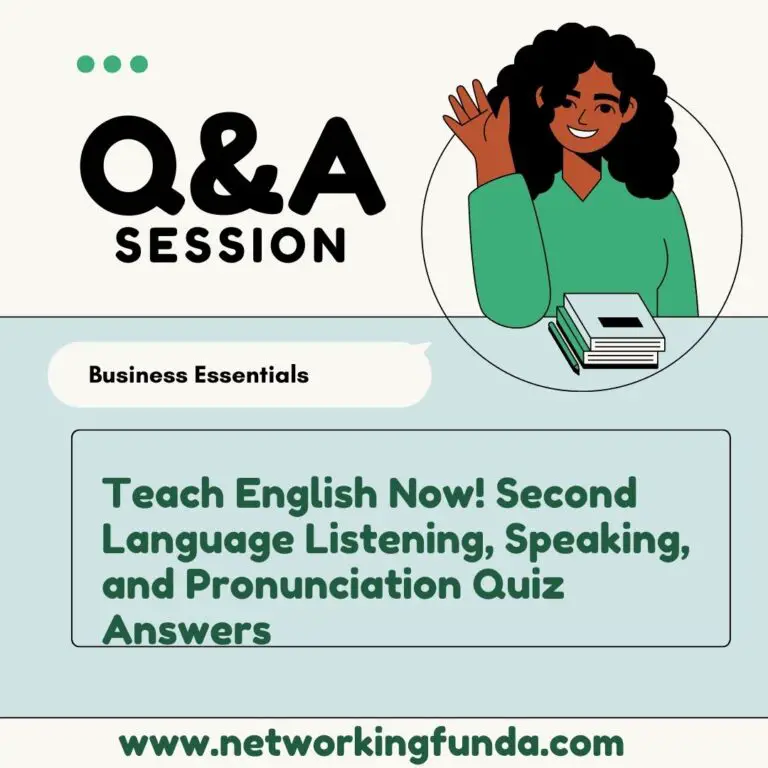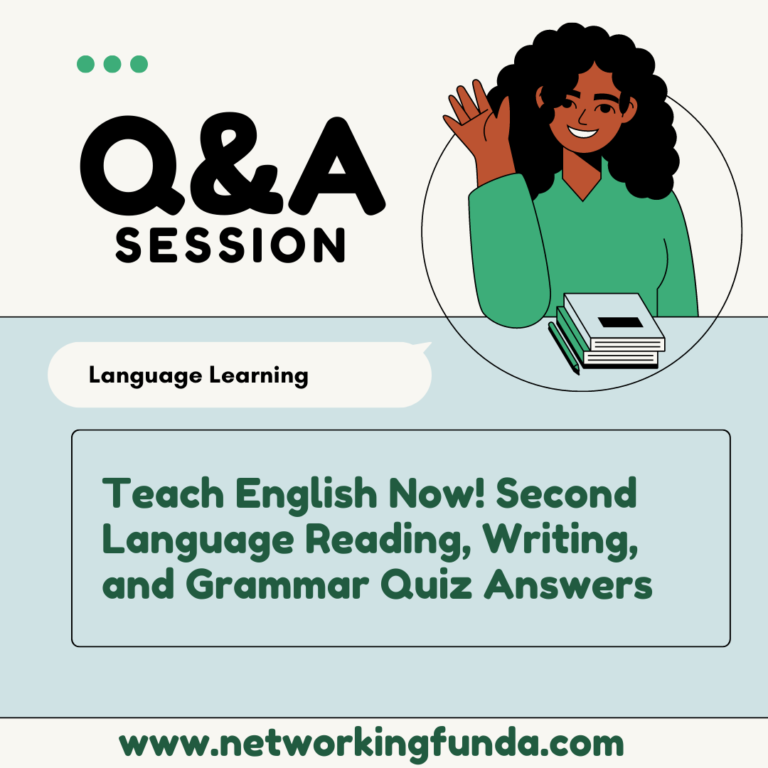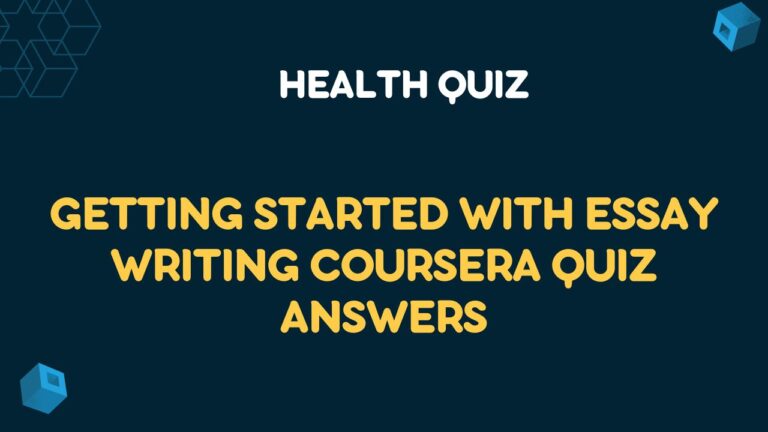Get All Week Successful Interviewing Coursera Quiz Answers
Table of Contents
01 Concept Quiz Answers
Q1. What is a needs analysis?
[expand title=View Answer] You analyze what the company needs and think about how you can meet those needs.[/expand]
Q2. In a prior job working for a large retailer, you analyzed company sales data in areas affected by hurricanes. Beyond the usual flashlights, batteries and bottles of water, you discovered that the top-selling item before hurricanes was beer. Your recommendation that the company stock up on beer before hurricanes resulted in 20% increase in pre-hurricane sales. What skill did you predominantly demonstrate?
[expand title=View Answer] made a data-driven decision [/expand]
Q3. What is the difference between a career strategy and a career plan?
[expand title=View Answer] Strategy generally involves setting goals, planning involves determining actions to achieve the goals. [/expand]
Q4. In the lesson, the word passion is used. Why is it important to have passion for a job or field?
[expand title=View Answer] If you have passion for something, you are likely a happier and more satisfied employee.[/expand]
Q5. What is the purpose of using language from a job posting in an interview?
[expand title=View Answer]
1.To reflect your understanding of the hiring manager’s needs.
2.To demonstrate your research.
3.To demonstrate your knowledge of the job vocabulary.
[/expand]
02 Concept Quiz Answers
Q1. Why does an interviewer ask you the “Tell Me About Yourself” question?
[expand title=View Answer] It serves as a nice way to start the business conversation. [/expand]
Q2. Which of the following questions are possible variations on “Tell Me About Yourself”?
[expand title=View Answer]
1.What makes you special?
2.How would you describe your character?
3.Why are you interested in this position?
[/expand]
Q3. Which of the following unspoken questions lies hidden behind the “Tell Me About Yourself” question?
[expand title=View Answer]What’s better about you than the other candidates I’m interviewing? [/expand]
Q4. When presented with the “Tell Me About Yourself” question, which of the following would leave a negative impression on an interviewer? Choose three.
[expand title=View Answer]
1.Lack of professional language.
2.Nervousness.
3.Lack of eye contact.
[/expand]
Q5. What are the most important aspects to consider when responding to this question?
[expand title=View Answer]
To connect your response to the position you are applying for.
To show that you know the company.
[/expand]
Language Quiz Answers
Q1. Which of the following sentences is correct?
[expand title=View Answer] We have been working on the project for five years. [/expand]
Q2. Which of the following sentences is correct?
[expand title=View Answer] If I did that, I would have no money left.[/expand]
Q3. Which of the following sentences is NOT correct?
[expand title=View Answer] If he doesn’t come in the next 10 minutes, we will start the meeting without him. [/expand]
Q4. Which of the following sentences is NOT correct?
[expand title=View Answer] I worked in sales for the last three years. [/expand]
Q5. Which of the following sentences is correct?
[expand title=View Answer] The product launch would have been successful if we listened to the consultant’s advice. [/expand]
Q6. Which of the following sentences is NOT correct?
[expand title=View Answer]
I look forward to meeting you tomorrow.
I look forward to meeting you tomorrow.
I am looking forward to meeting you tomorrow.
[/expand]
Q7. Which of the following sentences is NOT correct?
[expand title=View Answer] I admired your company for a long time. [/expand]
Q8. Which of the following sentences is correct?
[expand title=View Answer] Every day, I look over the reports of the customers to make sure that they are satisfied.[/expand]
Q9. Which of the following sentences is correct?
[expand title=View Answer]
Thank you, I understand your point now.
Thank you, I understand your point now.
Thank you, I understand your point now.
[/expand]
Q10. Which of the following is correct?
[expand title=View Answer] I rarely leave before 6 p.m. [/expand]
Q11. Which of the following collocations is not common in English?
[expand title=View Answer]relevant question[/expand]
Q12. Which of the following is non-standard English?
[expand title=View Answer] to fail a deadline [/expand]
Q13. Two managers each give you a job and both tell you the job is important. In this situation, an interviewer might ask you how you handle…
[expand title=View Answer] competing priorities [/expand]
Q14. Which of the following is non-standard English?
[expand title=View Answer] bottom priority [/expand]
Concept Quiz Answers
Q1. You should schedule your first interviews with companies or organizations in which you are most interested.
[expand title=View Answer]TRUE [/expand]
Q2. Conducting an informational interview can be an effective way to find a job.
[expand title=View Answer] TRUE[/expand]
Q3. You do not have to answer questions regarding age, sex, race, national origin, or marital status.
[expand title=View Answer] TRUE [/expand]
Q4. It is important to discuss salary requirements early in the interview.
[expand title=View Answer] FALSE [/expand]
Q5. When asked about your background, spend two minutes or so unless questioned further.
[expand title=View Answer] TRUE [/expand]
Q6. Avoid eye contact with the interviewer since it will make him or her uncomfortable.
[expand title=View Answer] FALSE [/expand]
Q7. You should smile as often as you can during an interview.
[expand title=View Answer] TRUE[/expand]
Q8. The interviewer does not expect you to be particularly well-informed about the company or organization. Understanding the position is all that’s expected.
[expand title=View Answer] FALSE [/expand]
Q9. The most productive method to obtain a job is through recruiters, personnel agencies, and online postings.
[expand title=View Answer]TRUE [/expand]
Q10. The majority of interviews are lost within a few minutes of entering the room.
[expand title=View Answer] TRUE[/expand]
Q11. It’s a smart move to ask your interviewer, “Who are your direct competitors?” It shows a genuine interest in the company and its market.
[expand title=View Answer]TRUE [/expand]
Q12. Greeting the receptionist when you arrive and treating him or her with respect is an important key to your success in an interview.
[expand title=View Answer] TRUE [/expand]
Q13. When responding to an interviewer’s questions, how long should your answers be?
[expand title=View Answer] Long enough to respond to the question and leave the door open for the interviewer to follow up. Short enough to keep the conversational ball moving back and forth. [/expand]
Q14. Can you make a joke during an interview?
[expand title=View Answer]Yes, if you feel that the interviewer will appreciate your sense of humor and if it seems appropriate. [/expand]
Q15. The interviewer asks you a question that you really don’t understand. What is your best response?
[expand title=View Answer] Say “I’m sorry, I don’t quite understand the question – could you repeat it please?” [/expand]
Q16. The interviewer asks you a question that you feel is inappropriate, such as “Are you planning to have children?” How do you respond?
[expand title=View Answer] Tell them that is an inappropriate question and they should mind their own business. [/expand]
Q17. You feel that the interviewer’s attitude towards you is hostile or rude. Perhaps the interviewer stares out the window or challenges your answers aggressively. What is your best response?
[expand title=View Answer] Reason that perhaps this is to test you in some way, and keep calm. [/expand]
Q18. Your interview starts off very well, but you begin to have trouble understanding the questions due to the rapid speech of the interviewer. What should you do?
[expand title=View Answer] Politely ask, “would you mind repeating the question please?” If necessary, re-phrase what’s being asked to clarify your understanding. [/expand]
Q19. The interviewer asks you about your salary history. How should you handle this question?
[expand title=View Answer] Sidestep the question. Only tell prospective employers what you’re expected to be paid now and in the future. [/expand]
Q20. The interviewer asks you “Why do you want to work for our company?” What would be your best response?
[expand title=View Answer] You’ve been the market leader for the past five years and my research shows it’s because of the reputation of your products and the high degree of customer satisfaction. I would like to contribute my services to continue the organization’s success.[/expand]
Successful Interviewing Course Review:
In our experience, we suggest you enroll in Successful Interviewing courses and gain some new skills from Professionals completely free and we assure you will be worth it.
Successful Interviewing course is available on Coursera for free, if you are stuck anywhere between a quiz or a graded assessment quiz, just visit Networking Funda to get Successful Interviewing Coursera Quiz Answers.
Get All Course Quiz Answers for the Business English Specialization
Business English: Management and Leadership Quiz Answers
Business English: Finance and Economics Quiz Answers
Business English: Marketing and Sales Quiz Answers



